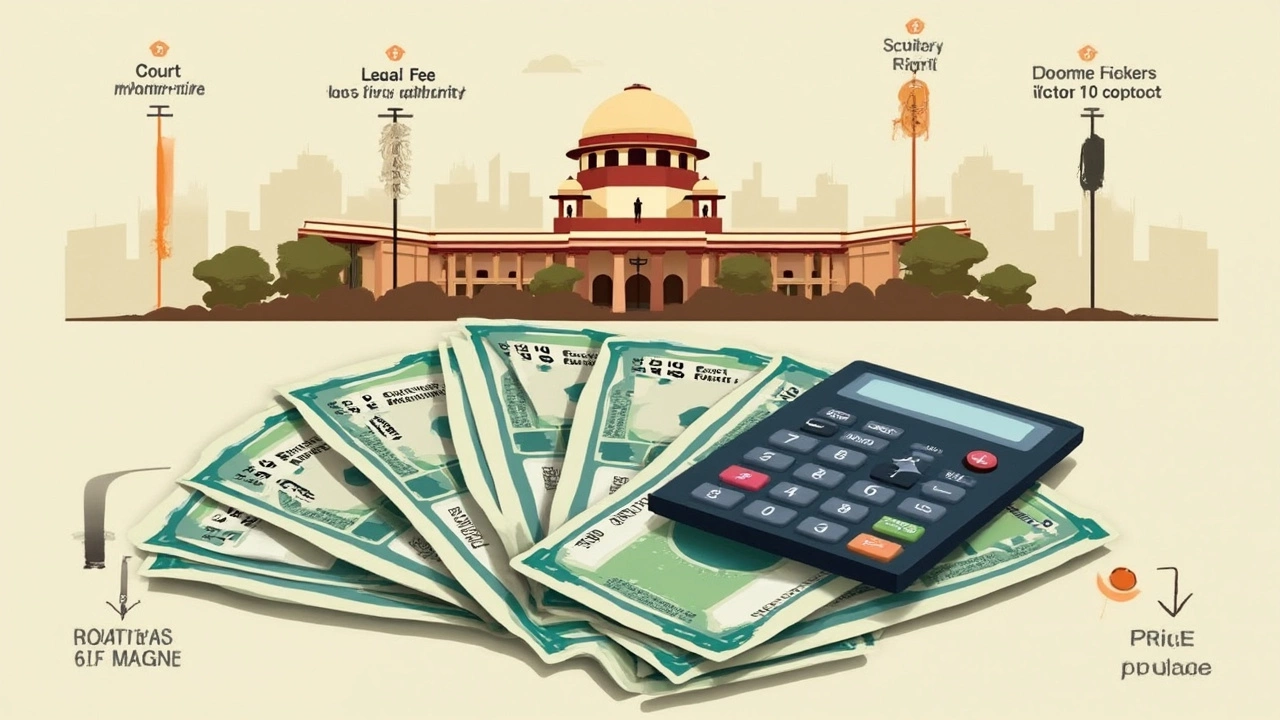Money is usually the first headache that pops up when you think about divorce in India. Nobody wants to get surprised by bills halfway through a tough process. So what does it actually cost to get a divorce here? Spoiler: there’s no single price tag, but you can plan smarter once you know the usual breakdowns.
The biggest expense for most people is the lawyer’s fee. They don’t all charge the same. In cities like Mumbai, Delhi, or Bangalore, a regular divorce lawyer might ask anywhere from ₹15,000 to ₹60,000 for a mutual consent divorce, while contested cases often go upwards of ₹1 lakh (and sometimes much higher if it drags on). And get this, you might have to pay more for every extra hearing or paperwork hiccup, so choose wisely.
But legal fees aren’t the only thing to budget for. There are court filing charges (usually between ₹100 and ₹2,000, depending on the state), plus you might need extra cash for paperwork, notarizations, and maybe some friendly under-the-table expenses (yeah, it happens, especially in slow courts). Want to cut down on costs? Read on—this guide will help you sidestep wasteful spending and see what’s absolutely necessary.
- Breaking Down Legal Costs
- Court Fees and Other Charges
- Alimony, Child Support, and Hidden Expenses
- Tips for Cutting Down Divorce Costs
Breaking Down Legal Costs
When you start looking into divorce in India, the first thing you'll notice is how much legal costs can swing from cheap to crazy expensive. It’s not just about handing a lawyer a lump sum and calling it a day. The type of divorce, city, and how aggressive the case gets—all this changes your final bill.
Let’s break it down. For a mutual consent divorce, where both people agree to split, legal fees are usually simpler and cheaper. Most lawyers in smaller cities charge ₹10,000 to ₹30,000 for the full process. In places like Delhi or Bangalore, the same process can push you to ₹40,000–₹80,000. That’s per person—each party pays their own lawyer.
Contested divorces, on the other hand, can feel like burning cash. If your spouse doesn’t agree and the case involves property fights, alimony, or custody drama, lawyer fees climb fast. It's common to hear about bills of ₹1 lakh to ₹2 lakh for cases that go on for more than a year. The more court hearings, the higher the meter runs.
| Type of Divorce | Average Legal Fees (per person) | Extra Charges (per hearing/documents) |
|---|---|---|
| Mutual Consent | ₹10,000 – ₹80,000 | ₹1,000 – ₹5,000 |
| Contested | ₹40,000 – ₹2,00,000+ | ₹2,000 – ₹10,000 |
Some lawyers work on a ‘hearing-to-hearing’ basis, charging for each time you show up in court. Others might quote a package for the whole case, but beware—if the divorce drags on, you might need to pay extra. Don’t forget GST, which is 18% on legal fees. And there’s usually a charge for paperwork, affidavits, or travel if your case is outside your city.
- Tip: Always get a written fee agreement. It keeps surprises away if things turn messy.
- If you can, compare fees between at least two or three lawyers before you settle.
- If money is tight, check if your state legal aid services offer help for those with lower income. They handle plenty of divorce cases each year, almost free.
So, when planning for divorce cost India, always ask how your lawyer charges and what gets you extra bills along the way. Clear talks at the start can save you serious regrets later.
Court Fees and Other Charges
Outside of what you pay your lawyer, there are a bunch of official and unofficial charges you’ll run into during a divorce in India. These aren’t massive compared to lawyer fees, but if you don’t plan ahead, they pile up and become annoying.
Here’s the usual stuff you can expect to pay for:
- Filing fee: When you submit your divorce petition in family court, you pay a filing fee. It’s usually pretty low—around ₹100 to ₹500 for a mutual consent divorce and ₹300 to ₹2,000 for a contested one. Some states charge less, but it almost never goes over ₹2,500.
- Document charges: You’ll need to get marriage certificates, ID proofs, and maybe property documents photocopied and notarized. Typical cost: ₹10 to ₹100 per document.
- Process fees: If you need to officially deliver (serve) a notice to your spouse, courts charge a small process fee. Budget ₹200 to ₹500 for this step.
- Translation fees: In some states, all official paperwork needs to be in the local language. Translators usually charge ₹500 to ₹2,000 per set of documents.
- Miscellaneous: Think travel to court, lunch while you wait through those endless hearings, or someone who helps you get in line or pull a file faster (yes, these side costs are real).
To make things clearer, check out this quick breakdown:
| Expense Type | Cost Range (₹) |
|---|---|
| Filing Fee | 100 - 2,000 |
| Document Notarization | 10 - 100 per document |
| Process Fee | 200 - 500 |
| Translation Fee | 500 - 2,000 per set |
| Other Misc. Charges | 500 - 2,000 (variable) |
Here’s a simple tip: Always keep extra copies of all major documents, and double-check which ones the court wants in advance. Running around at the last minute for a stamp or signature wastes money and time. Also, never hand over cash to anyone inside the courthouse unless you understand exactly what it’s for and get a receipt. Last thing you want is to pay twice for the same paperwork.
Divorce cost India isn’t just about what your lawyer pockets. These little “extras” can catch you off guard, so build them into your budget from the start.

Alimony, Child Support, and Hidden Expenses
This is where a lot of people get blindsided—alimony, child support, and all those sneaky extra costs. In India, alimony mostly comes up in contested divorces and isn’t fixed by law. The court looks at a bunch of stuff: how much each person earns, how long you’ve been married, age, health, and whether there are kids involved. There’s no magic number, but here’s a rough idea: sometimes a lump sum is 1/3rd to 1/5th of the husband’s total net worth. Monthly maintenance can range anywhere from ₹5,000 to ₹50,000 or more, depending on lifestyle and city.
Child support is a separate headache. It covers the basic stuff—school fees, food, clothing, and maybe rent if the child stays with one parent. Courts usually want what’s best for the kid, so if you’re the earning parent, you could be asked for anything between ₹7,000 and ₹25,000 a month (but it really depends on your income and the child’s needs). If both parents earn, courts may split it up.
| Expense Type | Average Range (per month) |
|---|---|
| Alimony (monthly) | ₹5,000 – ₹50,000+ |
| Child Support | ₹7,000 – ₹25,000+ |
| Lump Sum Settlement | 1/5th – 1/3rd of spouse’s net worth |
Now, about those hidden expenses—hardly anyone talks about them. Got property to split? Add on legal fees for property evaluation or sale (some lawyers ask for a cut). Some banks charge for loan restructuring if you have a joint home loan. Expect to pay extra for certified copies, travel, babysitters, and missed work days because hearings always take longer than you hope.
- Ask your lawyer upfront about ALL possible charges.
- Budget for at least 10%-15% more than what your lawyer quotes. Surprises happen.
- If you have joint loans or credit cards, talk to your bank before signing anything in court.
One more thing: states like Maharashtra add a small stamp duty on settlements through court, so don’t forget that either. It’s easy to focus just on the divorce cost India, but these little extras catch most people off guard.
Tips for Cutting Down Divorce Costs
Divorce in India can bleed your wallet if you don’t play it smart. But there are solid ways to keep those bills from spiraling out of control. Here’s how you can cut the fat and avoid paying more than you really need to.
- Go for mutual consent if at all possible. Mutual consent divorces are usually way cheaper and faster than contested ones. You and your spouse just need to agree on things like custody, alimony, and property—then you can avoid the never-ending court feud. Most mutual consent divorces cost between ₹15,000 and ₹60,000, while contested divorces can shoot over ₹1 lakh easily.
- Compare lawyer fees before you sign anything. Don’t feel pressured to hire the first lawyer you meet. Get fee quotes from two or three lawyers, ask about all potential costs (including per-hearing charges) in advance, and check if there’s a flat rate for mutual cases. Many lawyers give free or low-cost initial consultations, so use those to ask questions.
- Handle paperwork yourself where you can. Believe it or not, a lot of the forms and applications are available online. If you’re doing a divorce cost India comparison, simple paperwork jobs (like notarizing a document or getting a certified copy from the court) cost far less if you do them on your own.
- Document everything properly and keep proof of all payments and agreements. This can stop lawyers or others from tacking on ‘extra’ services you didn’t ask for. Organized files mean fewer return trips and fewer lawyer hours (which means more cash in your pocket).
- Negotiate fees up front—but get it in writing. If you’re clear about your budget and expectations, many lawyers will adjust a bit. Always get the deal on paper so there’s no last-minute surprises.
If you’re curious how these choices stack up, check out this simple table showing average costs in 2025 for different divorce types in major Indian cities:
| Divorce Type | Low-End Fees (₹) | High-End Fees (₹) | Notes |
|---|---|---|---|
| Mutual Consent | 15,000 | 60,000 | Usually 6-18 months |
| Contested Divorce | 40,000 | 2,50,000+ | Often over 2 years |
| DIY/Online Filing | 5,000 | 20,000 | Only for simple mutual cases |
One more thing: don’t get sucked into quick-fix divorce websites promising cheap ‘instant’ solutions. Many of them just take the money and run, or provide half-baked paperwork that costs more to fix later on. Stick with reputable sources and ask around for referrals to real lawyers.
